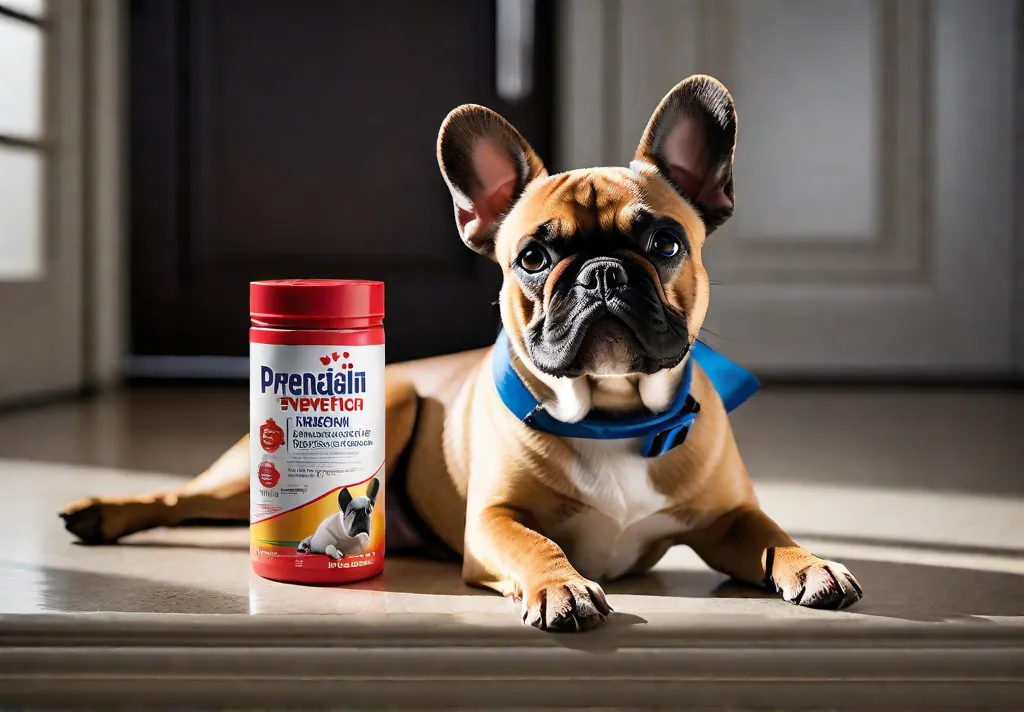With their adorably squished faces, bat-like ears, and charming personalities, it’s no wonder French Bulldogs have become one of America’s most popular dog breeds. As these affectionate companions continue to steal our hearts, their well-being should be our top priority.
However, Frenchies require special care and vigilance from owners due to their unique physical characteristics. Brachycephalic breeds like French Bulldogs, with their short skulls and compact breathing passages, are prone to various potential health issues – from respiratory distress to skin allergies to obesity.
The good news? Many common health problems can be prevented or managed through proactive care. Equipping yourself with knowledge and implementing preventative health strategies can help ensure your Frenchie friend enjoys a long, joyful, and healthy life.

This article provides ten essential tips to support the wellness and longevity of your beloved French Bulldog. From nutrition to exercise to veterinary care, these actionable recommendations will help you care for their physical and mental health needs at every stage of life. Read on to learn how minor adjustments to their routine care can make a significant difference!
Table of Contents
- 1 Introduction to Frenchie Health
- 2 Conclusion
- 3 Frequently Asked Questions
- 4 Related posts:
- 5 French Bulldog Puppy Training Tips: Maximize Playtime!
- 6 8 Surprising Secrets to Unlocking Your Frenchie's True Potential
- 7 Unleashing the French Bulldog Personality: Facts & Traits
- 8 8 Adorable French Bulldog Behaviors to Melt Your Heart
Introduction to Frenchie Health
As brachycephalic (short-nosed) dogs, French Bulldogs require special consideration to remain healthy and happy. Their adorable squished faces come at a cost – compacted airways and a tendency towards obesity, joint issues, dental disease, and more.
Staying informed about your Frenchie’s potential health risks allows you to minimize these through proactive care. Monitoring for signs of illness, maintaining a healthy lifestyle, and scheduling regular veterinary visits are all vital to supporting their well-being.
The following ten tips delve into the areas essential for protecting your French Bulldog’s health and ensuring they thrive!
Proper Nutrition
Like many breeds, French Bulldogs are prone to obesity. Excess weight puts pressure on their joints and airways, exacerbating health issues. Sticking to an appropriate diet is vital for supporting their wellness.

Tips for proper French Bulldog nutrition include:
- Consult your vet to develop a customized meal plan based on age, weight, activity level, and health status.
- Stick to high-quality commercial dog food formulated for small or medium breeds. Look for whole protein ingredients like chicken, lamb, or fish.
- Avoid overfeeding. Follow recommended portion sizes for weight maintenance.
- Incorporate dental chews to support teeth and gum health.
By feeding an appropriate diet tailored to your Frenchie’s needs, you help them maintain a healthy weight and prevent obesity-related illnesses.
Regular Exercise
Frenchies may be low to the ground but still require regular activity! Exercise benefits muscular and cardiovascular health while preventing obesity. Just be sure to tailor activities to your Frenchie’s physical limitations.
Appropriate exercises for French Bulldogs include:
- Short, daily walks (10-15 minutes)
- Indoor play sessions like fetching toys. This prevents overheating!
- Mental stimulation with puzzle feeders or hide-and-seek. Boredom leads to destructive behaviors!
Monitor your Frenchie during physical activity for signs of exhaustion like wheezing, coughing, or collapsing. Over-exertion can trigger life-threatening respiratory distress!

With appropriate activities catered to their abilities, exercise promotes healthy joints, optimal weight, and emotional wellness for your French Bulldog!
Routine Veterinary Care
No one understands your Frenchie’s health needs better than your veterinarian. Establishing a relationship with a trusted vet ensures any developing issues are caught early when treatment is most effective.
Essential elements of routine veterinary care include:
- Annual exams & diagnostics to evaluate internal organ health, dental status, parasite risk, and more.
- Vaccinations are needed to protect against rabies, parvo, and canine influenza.
- Parasite prevention is done with monthly heartworm, flea, and tick medication.
- Prompt attention is needed for any abnormalities, including changes in appetite, activity level, or bathroom habits.
By committing to routine veterinary care, you provide invaluable preventative medicine and early detection of illness in your French Bulldog!
Skin & Coat Care
Frenchies frequently suffer from skin allergies and infections in their facial wrinkles and folds. Establishing a regular grooming routine helps minimize these issues.

Tips for optimal French Bulldog skin & coat care:
- Brush coat 1-2 times weekly to distribute skin oils and remove shedding hair.
- Clean deep skin folds 2-3 times weekly using a damp, fragrance-free wipe. Check for redness, odor, or discharge indicating infection.
- Bathe monthly using a gentle, hypoallergenic shampoo. Blow dry thoroughly afterward.
- Schedule annual skin scrapings to check for parasite infestation.
- Consider probiotics & omega fatty acid supplements to support skin health and reduce allergies.
Consistent skin care and monitoring for abnormalities help prevent painful and frustrating skin conditions in Frenchies!
Respiratory Health
Brachycephalic Airway Syndrome refers to upper airway abnormalities affecting short-nosed breeds like French Bulldogs. Their compacted breathing passages put them at life-long risk for respiratory distress.
As a Frenchie owner, vigilance and preventative steps are crucial to optimizing respiratory health.
Tips for supporting your Frenchie’s airways include:
- Avoid strenuous exercise in hot, humid weather.
- Use a harness rather than a collar for walks to prevent airway compression.
- Maintain an ideal body condition score. Excess weight impairs breathing!
- Keep the home environment clean using air filters during seasonal allergies.
- Learn to recognize signs of respiratory distress – open mouth breathing, wheezing, blue gums. CALL YOUR VET if these develop.
- Consider corrective nasal surgery if airway obstruction is severe.

Supporting respiratory health is arguably THE most important job for French Bulldog owners!
Joint Health
The compact, stocky frame of French Bulldogs also predisposes them to orthopedic conditions like Intervertebral Disc Disease and Hip Dysplasia. Around 15% of the breed suffers from impaired joint health.
Protecting their vulnerable joints is critical to preventing mobility issues later in life. Focus on the following areas to support sound musculoskeletal function:
Tips for optimizing joint health include:
- Maintain an ideal body condition score to avoid excess weight strain.
- Administer glucosamine/chondroitin supplements to protect cartilage.
- Perform low-impact exercises like short walks rather than running.
- Provide ramps & stairs to access furniture. Jumping down causes joint trauma!
- Massage and stretch gently before and after walks to keep muscles flexible.
Committing to joint-conscious care helps ensure your Frenchie stays active and comfortable through their senior years!

Dental Health
Unfortunately, Frenchies frequently suffer from significant dental disease. Their short muzzles and crowded teeth create a literal breeding ground for bacteria!
Tips for protecting your Frenchie’s pearly whites include:
- Brush teeth daily using dog-safe toothpaste. Reward with treats for cooperation!
- Schedule annual dental cleanings under anesthesia for thorough tartar removal and tooth assessment.
- Feed dental chews to disrupt tartar and massage gums.
- Avoid sugar-containing treats that promote decay.
- Monitor for oral tumors during home teeth brushing.
Committing to good oral hygiene prevents dental decay and its associated consequences – infection, tooth loss, pain, and expense!
Mental Health
Don’t forget – dogs have mental health needs, too! Frenchies require plenty of stimulation to stay happy and prevent destructive behaviors born of boredom.
Tips for keeping your Frenchie mentally engaged include:
- Incorporate new toys & puzzles like Kongs and snuffle mats to prevent boredom. Rotate frequently to keep it interesting!
- Train using positive reinforcement to strengthen your bond while building your cognitive abilities.
- Socialize extensively to boost confidence, reduce separation anxiety, and prevent aggression towards people or other pets. Expose them to various sights, sounds, smells, and situations in a controlled, positive manner during the first four months of life.
- Spend quality one-on-one time daily via play sessions, training, massage, etc. This prevents depression!

By nurturing your Frenchie’s emotional needs alongside their physical ones, you support comprehensive wellness and happiness!
Preventative Care
Preventing illness is far more accessible (and less expensive) than treating it! Investing in preventative care provides peace of mind by safeguarding your Frenchie’s health.
Key preventative care recommendations include:
- Spay or neuter by six months of age to eliminate reproductive cancer and disease risk.
- Microchip your dog for identification purposes should they ever become lost.
- Purchase pet insurance to defray medical costs for accident or illness coverage.
- Perform routine parasite testing & prevention, including heartworms, intestinal parasites, fleas, and ticks.
- Conduct genetic testing for known breed-specific conditions. Share results with your vet to customize a wellness plan.
- Enroll in pet poison control for 24/7 access to emergency poisoning treatment advice.
An ounce of prevention provides invaluable protection for safeguarding your beloved Frenchie’s health!

Schedule Annual Wellness Exams
Preventative care is the key to early illness detection and management. By scheduling annual veterinary wellness visits for your French Bulldog, you ensure emerging health issues are caught early before causing irreparable damage.
Components of the annual wellness visit include:
- A nose-to-tail physical exam assesses the eyes, ears, mouth, skin, limbs, vital organs, and body condition.
- Diagnostic testing, such as bloodwork, urinalysis, x-rays, and ECG, is used to evaluate internal organ function.
- Review of preventative health recommendations, including parasite control, nutrition, exercise, and immunizations.
- Customized lifestyle adjustments targeted to your Frenchie’s evolving health needs.
By committing to annual wellness care, you invest in your beloved pet’s lifelong health!
Conclusion
Owning any dog is a responsibility – but French Bulldogs have unique care requirements. Their adorably smooshed faces and stocky bodies predispose them to certain health risks. However, committing to their well-being can prevent or minimize many conditions!

By following these ten essential tips for nutrition, exercise, veterinary care, respiratory support, and beyond, you help ensure your Frenchie friend lives their most extended, happiest, and most comfortable life possible.
As your loyal companion through the years, they deserve nothing less than our utmost commitment to their health and happiness! By taking a proactive stance and addressing issues early, you safeguard extra time together – and isn’t that what it’s all about?
Frequently Asked Questions
Q: How can I tell if my French Bulldog has trouble breathing?
A: Signs of respiratory distress in French Bulldogs include noisy/difficult breathing, gagging/coughing, exercise intolerance, blue gums, restlessness, and collapse. Seek prompt veterinary attention if noted.
Q: What health screens should responsible French Bulldog breeders perform before breeding?
A: Reputable French Bulldog breeders conduct X-rays to rule out hip dysplasia, airway exams to assess stenotic nares and elongated soft palates contributing to breathing issues, eye exams to check for inherited defects, and DNA tests for conditions like degenerative myelopathy.
Q: What temperature parameters should I avoid walking my Frenchie in?
A: Once temperatures exceed 80°F, refrain from strenuous outdoor exercise with your French Bulldog. Their compromised cooling capacity puts them at high risk of deadly heat stroke!
Q: How can I financially make my Frenchie puppy’s vaccination series manageable?
A: Discuss Vetster’s puppy vaccine plan with your veterinarian! For $15/month, your pup receives all core vaccines, deworming, and a wellness exam – saving hundreds of dollars over paying individually.